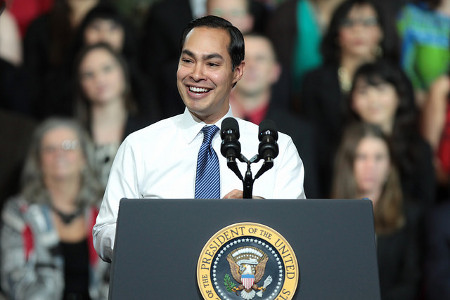USApp Managing Editor, Chris Gilson looks at the best in political blogging from around the Beltway. Our round-up of state blogs will follow on Saturday afternoon.
President Obama, the Democratic Party, and the GOP
This week President Obama continued to push for Congress to grant him fast-track authority to negotiate trade deals, such as the Trans-Pacific Partnership, which is currently being negotiated. The Daily Signal writes on Wednesday that Obama’s push is causing conservatives some difficulty as they support free trade, but dislike the president. Politicus USA, meanwhile reports that Obama’s favorability rating has jumped four points to 53 percent, its highest level since 2013.
On Monday, President Obama announced that the federal government would stop police forces across the country from acquiring military equipment. While many have welcomed the move, Wonkblog points out that the administration has not decided what to do about the equipment already possessed by police forces. Since 1997, police chiefs have stockpiled $4.3 billion worth of surplus military equipment from the Pentagon.

Political Animal looks at President Obama’s relationship with the Democratic Party, and its future. They say that former Secretary of State, Hillary Clinton, is courting the ‘coalition’ of young and diverse voters who helped Obama to win in 2008 and 2012, and that if she really wants to bolster her chances of gaining these voters, she should nominate the current Secretary of Housing and Human Development, Julian Castro, as her Vice President.
Turning to the Republican Party, Outside the Beltway discusses what the GOP can learn from the Conservatives’ victory in May’s general election in the United Kingdom. They comment that while we should be cautious in drawing lessons from other countries, the Conservatives’ positive vision which looked to the future was something to learn from, and may be one reason why the GOP’s presidential candidates are now playing down their links to the Iraq War. On Tuesday, Daily Kos writes that Republicans in the House and Senate found themselves at an impasse over reforms of the National Security Agency’s (NSA) program of the bulk collection of telephone metadata under Section 215 of the Patriot Act. They say that while the House has passed the USA Freedom Act which ends the collection of the metadata, Senate Republicans were standing firm that the program should continue.
Elections and the road to 2016
Looking at Congressional races in the 2016 elections, Roll Call’s Rothenblog wonders whether the GOP can repeat their surprise 2014 win in Colorado. They say while the race leans in the favor of the incumbent Democratic Senator, Michael Bennet, the GOP still has plenty of reasons to look for a strong challenger to take advantage of how competitive the state is.
On Monday, National Journal looks at a state House race in New Hampshire with national implications. They say that the recent election in the state’s 32nd District, was marked by the participation of GOP presidential hopefuls, such as former Texas Governor, Rick Perry, and HP Executive, Carly Fiorina. They say that such participation helps candidates to win the trust of ‘small-town powerbrokers’ who are crucial in the upcoming New Hampshire primary.
Looking to the 2016 presidential election itself, Americablog writes Monday that the Democrats’ so-called ‘blue wall’ of states which have voted for the party in every election since 1992 (and account for 242 electoral votes) was actually built by the Republican Party, which they say does not share America’s values.
Moving to the Republican side of the 2016 presidential race, this week saw both CNN and Fox release their guidelines for the debates (which begin in August) which sets a cutoff of ten candidates, who will be chosen by placing in the top ten of an overage of the five most recent national polls. The Atlantic says that this year the problem is that the GOP has too many legitimate candidates, but it is clear that the field needs to be limited.
Here’s a summary of this week’s developments in that still very large Republican Presidential field:
- Senator Lindsay Graham (SC) stated that he would ‘kill’ anyone who was thinking of joining ISIS or planning a terrorist attack while he was president (Outside the Beltway).
- While Scott Walker stated he is the ‘most qualified’ of the GOP candidates on foreign policy since he visited six countries whilst Governor of Wisconsin, Florida Senator Marco Rubio may actually be the fields’ ‘foreign policy star’ (Crooks & Liars).
- Townhall wonders if Rubio has the ‘Reagan magic’…
- …as Outside the Beltway reports that Ohio Governor John Kasich is ‘virtually certain’ to be running for President.
- Kentucky Senator Rand Paul, meanwhile, has been using a filibuster against the renewal of the Patriot Act to get himself back into the 2016 conversation (National Journal).
- Former Florida Governor Jeb Bush is going to skip the August Iowa Straw poll – but will he also give the Caucus a miss? (Outside the Beltway).
- American Thinker reckons that Carly Fiorina may well be 2016’s surprise dark horse.
- Is New Jersey Governor Chris Christie in denial about his 2016 chances? Political Animal thinks so.
Moving over to the Democrats’ 2016 field:
- American Thinker ponders whether a conservative Democrat would be able to challenge Hillary Clinton…
- …while Political Animal asks if Clinton would run to the left without being pressured by primary opposition.
- Hit & Run meanwhile looks at the unfolding news that former staffer, Sidney Blumenthal, sought to influence Clinton while she was Secretary of State.
- Bill and Hillary Clinton have made millions on the speaking circuit over the last 16 months (Outside the Beltway).
- Want to make Clinton answer questions? The Federalist reckons that one way would be to start ignoring her campaign.
- In not-Clinton news, Vermont Senator Bernie Sanders has raised $4 million from 100,000 contributors in recent weeks (PoliticusUSA).
Government, the Beltway and Congress’ agenda
On June 30th, the charter of the Export-Import Bank is due to expire, unless it is reauthorized by Congress. The Daily Signal says that if the bank was to be wound up, thousands of jobs would not be lost. They say that the bank’s export subsidies do not create jobs – they merely redistribute them from unsubsidized firms to subsidized ones.
On Monday, The Daily Signal looks at the ‘5 biggest lies, myths, and debunked claims’ of the scandal facing the Internal Revenue Service (IRS) over its alleged targeting of conservative groups. These include that there was no targeting program, and that relevant emails from IRS official, Lois Lerner, were ‘lost’ in a 2011 computer crash.

Moving on to another Government agency, the Federal Reserve (or ‘Fed’), Wonkblog reports this week that the minutes of the Fed’s April policy-setting meeting show that a June interest rate rise is highly unlikely, mostly due to disappointing growth in the first quarter of 2015.
Looking at the House of Representatives, The Daily Signal reports on another government program that will soon need to be reauthorized – the Highway Trust Fund, which expires at the end of May and faces a $13 billion deficit. GOP House lawmakers have introduced a bill which would extend the Fund until the end of July.
Over in the Senate, Rand Paul of Kentucky gave an 11-hour speech on Wednesday on the renewal of the Patriot Act. Outside the Beltway say that the speech was not really a filibuster – it wasn’t really directed at stopping debate on the legislation – but more an effort by Paul to ‘mess up’ Majority Leader Mitch McConnell’s (R-KY) voting and debate calendar.
On Tuesday The Daily Signal writes that Senator David Purdue (R-GA) is pushing for the Consumer Financial Protection Bureau to be restructured, due to its relative lack of accountability to Congress on how it spends its money. They say that the Bureau has been criticized for its spending – Purdue’s bill would bring the agency into the regular congressional appropriations proves.
Foreign policy, defense and trade
On Tuesday, Townhall looks at what they say is the ‘poverty’ of President Obama’s foreign policy. They write that Obama’s broad approach to security issues has been appeasement, especially in the wake of Russia’s ‘veiled’ invasion of Crimea.
The American Prospect this week discusses moves in Washington to increase defense spending in the wake of the House passing a $612 billion defense authorization bill. They say that nearly all of the 2016 candidates want to see a bugger military budget, and that this is not to deal with threats, but to project American power outwards.
The past week has seen many Republican presidential candidates grapple with the question, “Would you have invaded Iraq?” in reference to the 2003 war. The Atlantic says that most of the candidates have claimed that the U.S. was correct in going to war, with the intelligence at the time, meaning that war is now seen as the correct response to potential nuclear proliferation by other countries. Perrspectives, meanwhile, says that the fact that most GOP candidates would not have supported the war in Iraq given what we know now, undermines the case for a similarly preventative war against Iran over that country’s nuclear program.
Obamacare and health policy
On Monday, The Hill’s Congress blog comments that the Republican dominated Congress is not ready if the subsidies for federally facilitated marketplaces established in states which do not have their own exchanges under the Affordable Care Act are thrown out by the Supreme Court this summer. Meanwhile, Red State writes this week that special extended enrollment period for Obamacare’s federal exchange and in 11 states has not worked so well given that only 147,000 took advantage out of 30 million who remain uninsured.
One major aspect of the Affordable Care Act was the expansion of Medicaid across the states. Daily Kos says that some Republican state administrations are refusing to expand the program in their states because they are worried that the government may cut funding back in subsequent years, even after Medicaid rolls have been massively increased.
Crooks & Liars looks at the effects of a strategy from health insurance company executives in the early 2000s which would bring in lower premiums, but higher deductibles. They say that the effects of this strategy – which are now playing out – are that many Americans are finding themselves to be underinsured and are going without needed care as they are unable to pay for it.
The economy and society
On Monday, Wonkblog looks at a new report which shows that the trend of relatively high unemployment for recent college graduates is slowly moving into reverse. They say not only are graduates getting highly skilled jobs, but so are those with less education as well.
This week saw controversy over the revealing of donations given by This Week and Good Morning America host George Stephanopoulos to the Clinton Foundation, calling into question his objectivity. The Federalist comment that we would all be better off if political journalists were openly biased.

Hit & Run reflects on the shootout between rival biker gangs in Waco, Texas this week, and what it means for police reform. They say that comparisons between how the Waco suspects were treated with the recent treatment of African Americans in Baltimore and Ferguson, as many have made, are unhelpful and do nothing to move needed police reforms forward.
America’s infrastructure is crumbling, but Congress does not seem to be able to solve the problem, writes The Atlantic on Wednesday. They say that the federal gas tax which funds the Highway Trust Fund (mentioned above) has not increased in more than 20 years, and there is little chance of bipartisan agreement on how to fund it and other infrastructure projects beyond token stopgap measures.
Religious Freedom acts in several states have been in the news in recent months, because they enable discrimination against LGBT people on religious grounds. Americablog writes Monday that Satanists and pot smokers are testing these laws to avoid laws that put in place abortion waiting times and ban cannabis use. Despite such laws, the U.S. is becoming more progressive, at least according to a poll out this week that shows 60 percent of Americans now support same-sex marriage (Outside the Beltway).
And finally…
President Obama finally joined Twitter this week. Hilarity ensued.
Some members of Congress are living rent-free in the Capitol.
What do you call someone from Maine? Find out here.
Featured image credit: Official White House Photo by Pete Souza.
Please read our comments policy before commenting.
Note: This article gives the views of the author, and not the position of USApp– American Politics and Policy, nor of the London School of Economics.
Shortened URL for this post: http://bit.ly/1ekWpYP






